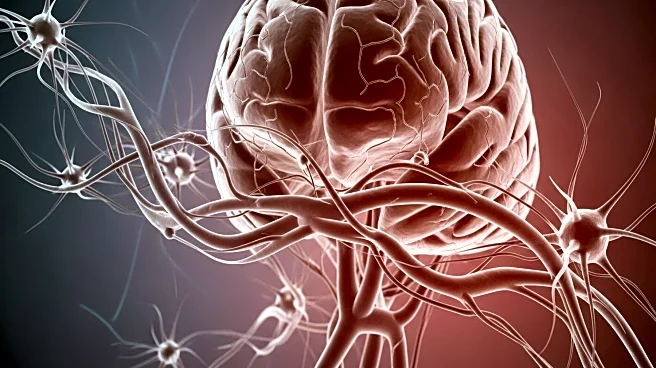What's Happening?
Recent research has highlighted the role of neuronal MCT2 in promoting angiogenesis in the developing mouse neocortex. The study focused on the S1 cortex, where neuronal activity was stimulated through whisker stimulation (WS), leading to increased blood vessel (BV) formation. The research identified that MCT2, a monocarboxylate transporter, is crucial for lactate influx into neurons, which in turn induces the expression of immediate early genes like cFos and MCT2 itself. This process is essential for the formation and maintenance of BV networks, particularly capillaries and venules, in the developing brain. The study utilized various methods, including RNA sequencing and immunostaining, to demonstrate that MCT2 expression is predominantly found in neurons and is necessary for the activity-induced angiogenesis observed in the S1 cortex.
Why It's Important?
The findings underscore the significance of MCT2 in neural development and its potential implications for understanding brain vascularization. By elucidating the mechanisms through which neuronal activity influences angiogenesis, this research could inform therapeutic strategies for neurovascular disorders. The study suggests that enhancing MCT2 activity or mimicking its effects could potentially aid in conditions where angiogenesis is impaired. Furthermore, the research highlights the interconnected roles of neural activity, lactate metabolism, and vascular development, offering insights into how metabolic processes influence brain function and development.
What's Next?
Future research may explore the therapeutic potential of targeting MCT2 in neurovascular diseases. Additionally, further studies could investigate the role of MCT2 in other brain regions and its involvement in adult neurogenesis and angiogenesis. Understanding the broader implications of MCT2-mediated lactate signaling could also lead to advancements in treating metabolic and neurodegenerative disorders.
Beyond the Headlines
The study opens avenues for exploring the ethical and clinical implications of manipulating metabolic pathways in the brain. As researchers delve deeper into the role of lactate and MCT2 in neural development, considerations around the long-term effects of such interventions will be crucial. The research also prompts a reevaluation of the traditional views on lactate as merely a metabolic byproduct, highlighting its role as a signaling molecule in brain development.











